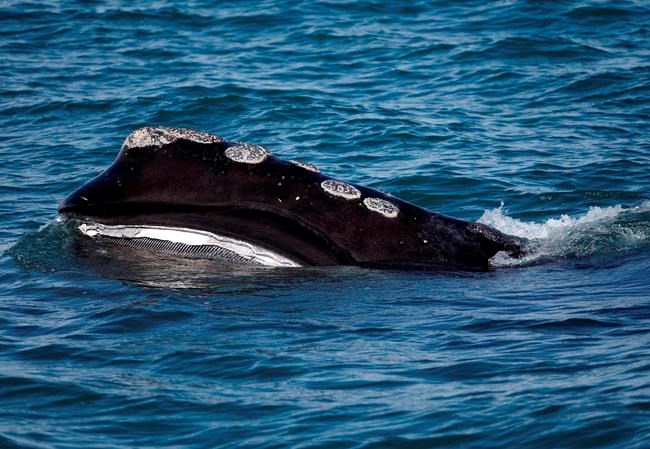OTTAWA — Voluntary speed restrictions in place for vessels passing through the Cabot Strait don't go far enough to protect endangered North Atlantic right whales, according to a newly released report.
Oceana Canada says an analysis of vessel tracking data indicates that two-thirds — 1,055 out of 1,565 ship transits of the strait studied in 2020 — ignored the voluntary 10 knot slowdown measure that was put in place by Transport Canada to protect the whales against deadly strikes.
Tracking of vessels longer than 13 metres that was conducted last spring and fall using data collected by Global Fishing Watch also found that more than 40 per cent of those transits exceeded 12 knots, increasing the risk to the whales.
"What we found really is unless you are going to make something mandatory, your compliance rate is not going to be very high," said the organization's campaign director, Kim Elmslie.
Elmslie said the numbers aren't favourable, especially when compared to Transport Canada's mandatory compliance rates in the western Gulf of St. Lawrence, which are around 90 to 95 per cent.
She said the data indicates voluntary slowdowns aren't working and the federal government should put in place a mandatory season-long slowdown in the Cabot Strait.
"You do need all vessels slowing down," Elmslie said. "We need to see that level of compliance that we are seeing in those mandatory (Gulf) rates."
Last week, Ottawa announced the same voluntary 10-knot limit -- roughly 19 kilometres per hour -- will remain in place for boats travelling through the strait from April 28 to June 29 and again from Sept. 29 to Nov. 15 to protect right whales migrating in and out of the Gulf of St. Lawrence.
There were no North Atlantic right whale deaths or entanglements in fishing gear recorded in Canadian waters in 2020, but the previous five years saw 25 deaths recorded for a species with an estimated world population of just 366.
According to Oceana, a total of 643 vessels made 1,565 transits through the strait during last year's slowdowns.
The study found that about 26 per cent of those transits occurred at speeds between 10 and 12 knots, while 40 per cent exceeded 12 knots.
Overall, it found there was greater compliance with speed restrictions in the spring period compared to the autumn, with a 10-percentage-point difference between the two. It said that may be due in part to more intense weather in the autumn, which would require some vessels to increase speeds.
Despite low compliance during the voluntary slowdown periods, the study found the measure did reduce vessel speeds.
In the two weeks before and after it took effect in the spring, 87 per cent of vessels travelled at speeds greater than 10 knots, while in the autumn, 92 per cent were above 10 knots. During the slowdowns, however, that number dropped to 67 per cent.
Oceana says while there was an improvement in the speed of vessels, it just isn't enough to save right whales.
"The faster you go the more risk it is to a whale ... especially with these big vessels," Elmslie said.
The organization points out that researchers have found that vessels of all sizes have the potential to cause lethal injuries to whales, with the risk increased significantly as the size and weight of vessels increases.
The federal Fisheries Department has announced that mandatory restrictions on ship speeds will remain in place throughout much of the Gulf of St. Lawrence, beginning April 28.
In addition to other measures, a monitoring program will include multiple aircraft, a drone, on-the-water vessel surveillance and underwater hydrophones.
"There hasn't been an overall weakening in the measures so that is positive, but we are always looking for those areas where things can be strengthened," Elmslie said.
As a result, Oceana is calling on Ottawa to extend speed restrictions throughout the Gulf of St. Lawrence to all vessels, including those smaller than 13 metres.
It also wants vessel monitoring system data made public, a reduction in the amount of fishing rope in the water through continued long-term support for ropeless gear, and an expansion in the use of technologies to monitor right whales among other measures.
This report by The Canadian Press was first published Feb. 22, 2021.
- By Keith Doucette in Halifax
The Canadian Press



